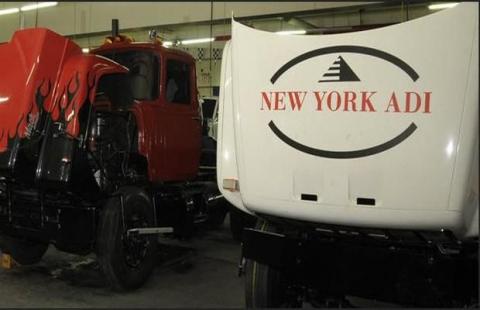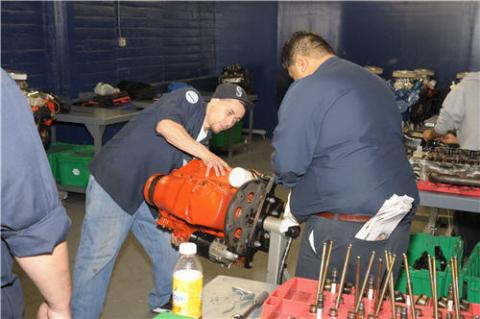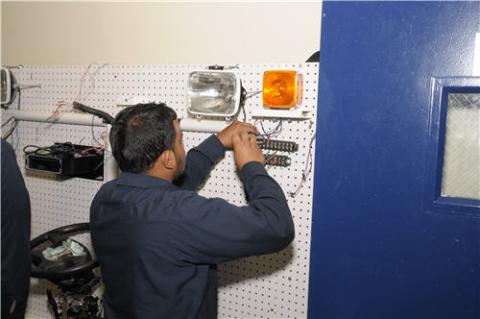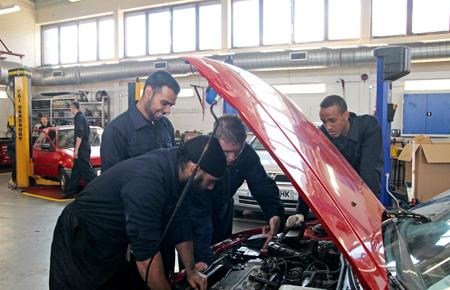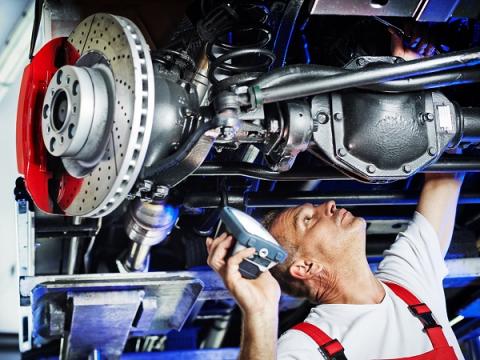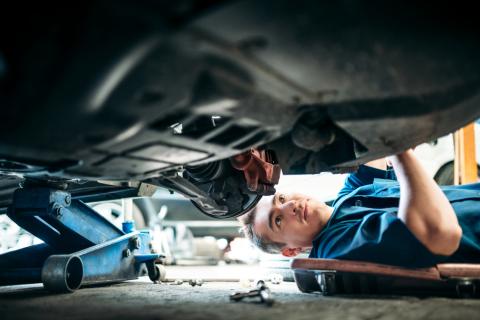Be Safe Out There
It’s cold. It’s wet. The roads are slick. These conditions mean that you need to take extra care when driving – for your sake, the sake of your vehicle, and the safety of other cars and pedestrians. From 13 years experience living in the frozen north of upstate NY, I have a few tips. I always had my car spray waxed in the winter; it helped to make the ice slide off the windshield easier. Be sure to get that salt cleared from your undercarriage as soon as it thaws
Auto Motivation
Happy New Year! It’s the time to make or act upon those plans for the new improved YOU. Near the top of everyone’s list is usually a career plan. How about you? Are you completely satisfied with your income and day to day work? Is your brain full to the top with knowledge and skills? If the answer is no – or even maybe, you may be interested in a new direction. Have you considered a career in the automotive or diesel industry? Today’s sophisticated engines require well trained, creative technicians to
New York Automotive and Diesel Institute Automotive Program Receives National Accreditation
The automotive training program at New York Automotive and Diesel Institute in Queens, NY has received accreditation by NATEF and The National Institute for Automotive Service Excellence (ASE). New York Automotive and Diesel Institute automotive program has been accredited in the following areas: Automotive, Truck and Diesel and Collision Repair. To achieve this coveted recognition, the school’s automotive training program underwent rigorous evaluation by the National Automotive Technicians Education Foundation (NATEF). Nationally accepted standards of excellence in areas such as instruction, facilities, and equipment were used. “This is great news for automotive-minded
Automotive Technician Jobs
You’ve always had a passion for cars and trucks and now you can get paid to do what you love with a career as an auto mechanic. Jobs in the automotive service marketplace today demand technicians with strong and up-to-date training not only in the basics, but in electronics and computerization as well. At New York Automotive and Diesel Institute we strive to provide the highest level of instruction required to pursue the automotive mechanic career of your dreams. Upon graduating from New York ADI, students will be prepared to meet
Certified Automotive Technician Training
necessity in getting hired as an automotive technician. NYAHaving the proper automotive technician education and training from ASE certified instructors is aDI’s team of top notch instructors will provide the best certified automotive technician training in New York. Our automotive training programs provide the theoretical knowledge and practical “real world” skills necessary to effectively service the latest vehicles and ensure customer satisfaction. ASE Certification Training ASE certification allows auto technicians to show they have proven themselves to be knowledgeable professionals and get the respect and recognition they’ve worked so hard to earn. NYADI’s auto
Automotive Technician Education
New York Automotive and Diesel Institute strives to provide the highest level of automotive technician education required to meet the high-tech demands of the automotive service marketplace today. Our auto technician school utilizes only the finest, most up-to-date, training resources, including today’s most popular cars, and the latest industry tools and standards. At NYADI we believe that academic excellence and quality vocational/technical auto technology training provide our students with the essential “tools of the trade” necessary to meet the requirements of an ever-changing automotive repair service market, and will thereby enhance the graduate’s
Auto Tech is Cool
For people who love cars there is a satisfaction in working with their hands to maintain and fix them. The great thing is that auto dealers are eager to find help, so this is the time to live your dream and get paid at the same time. If you are looking for a lifelong career with great potential for growth, consider automotive or diesel technology. There is a high demand for skilled, experienced technicians now and will be far into the future. Automotive technology is becoming more advanced and innovative day by
ARE YOU A VET?
Are you ready for the next challenge? Seventeen percent of New York Automotive & Diesel Institute’s students are. Some of our veterans are direct from service, some much older. They are not here because they don’t want courses in literature or foreign languages, but because they are aware of the career potential in the automotive and diesel industry. In short, this is an applicant’s market. Major employers, private and governmental, are eager for new hires. Many veterans already have job experience in the field, a prerequisite for immediate placement as a technician.
Career Path: Going from Line Technician to Shop Foreman
Developing a career as an auto technician can bring you far along as the years go by. While you may start out as a basic technician at an auto shop, there's nothing that says you need to stay in that position. The skills you can learn and develop as a technician can help you someday become a shop foreman or even a franchise manager. These skills include: 1. Diagnostic Capabilities A frustration that everyone wants to avoid is going to an auto repair shop to identify a problem, only for the technician to
Why Technical Schooling Is a Great Alternative To Community College
Whether you’re just graduating high school or looking to further your career prospects, you may be caught between choosing a community college or a technical college, like NYADI. While one avenue often leads to a degree, the other offers on-the-job experience. Here’s why technical colleges make great alternatives to community colleges. Train For The Job You Want Traditional community colleges offer a vast array of classes in general education subjects, such as English, history and mathematics. Course requirements may also necessitate that you take classes that have little or nothing to do


